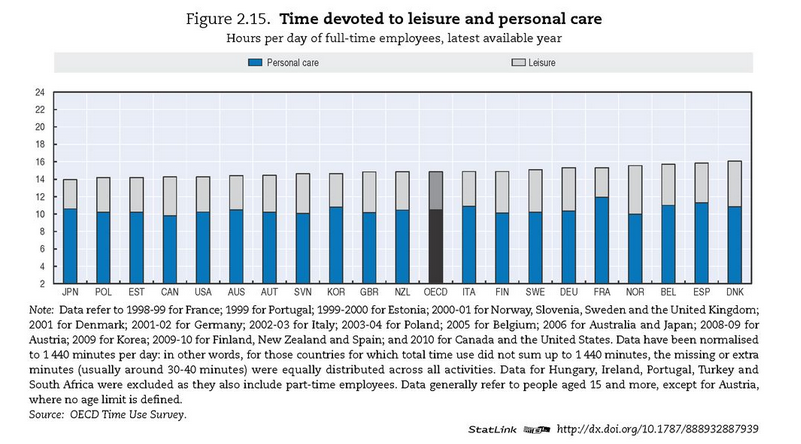The best countries for work-life balance


Get involved with our crowdsourced digital platform to deliver impact at scale
Stay up to date:
Financial and Monetary Systems
America needs to take a break.
According to a report from the Organization for Economic Cooperation and Development (OECD) that ranked its 34 member countries on work-life balance, the United States comes in 29th in the category, which the report attributes to long work hours and a lack of social activities.
Take a look:
The biannual report measures work-life balance by looking at the proportion of employees who work 50 hours a week or more and the amount of time workers spend “devoted to leisure and personal care” per day.
The United States has been on the low end of the scale for years. In 2012, the OECD chided the U.S. for poor investment in child welfare and for being “the only OECD country without a national paid parental leave policy.” (Although, as the Atlantic’s Derek Thompson points out, this has more to do with the fact that welfare is run through the tax code, meaning “we have to work for our welfare.”)
How did the rest of the world do? Denmark, where people spend five to six hours a day on leisure, comes in first. Turkey, where more than 45% of workers have work weeks of longer than 50 hours, comes in last.
Source: OECD Source: OECDThere’s more than a country imbalance. The report highlights gender inequality as another indicator of a poor work-life balance — while men across the world work more hours than women, they also have more leisure time, largely because women tend to do more unpaid work around the house.
For Americans, this poor work-life balance has plenty of real-world financial and social effects. While American workers have been getting more productive in the past few decades, wages haven’t increased all that much. If median household income had kept pace with our economic output, according to Mother Jones, it would be $92,000, nearly twice what it is now.
And that’s just the macro view. On a personal level, working too much can have drastic health effects. Being deskbound for long hours makes you heavier, hurts your back and neck and puts you at a greater risk for heart disease and other organ problems. Not to mention, there’s a mental toll, as stressful work can double your risk of depression.
So while people work longer and longer hours, slowly wrecking their bodies in the process, the only ones who benefit are those at the top. It should be more than enough to make you want to push over your desk and take a vacation to Denmark. And then maybe stay there for good.
Published in collaboration with Mic
Author: Matt Connolly has written for Mother Jones, the Washington Examiner and Chicago Public Radio among many others.
Image: A stockbroker looks at stock index numbers on his computer screen at a brokerage firm in Mumbai August 6, 2007. REUTERS/Punit Paranjpe.
Don't miss any update on this topic
Create a free account and access your personalized content collection with our latest publications and analyses.
License and Republishing
World Economic Forum articles may be republished in accordance with the Creative Commons Attribution-NonCommercial-NoDerivatives 4.0 International Public License, and in accordance with our Terms of Use.
The views expressed in this article are those of the author alone and not the World Economic Forum.
Related topics:
The Agenda Weekly
A weekly update of the most important issues driving the global agenda
You can unsubscribe at any time using the link in our emails. For more details, review our privacy policy.
More on Financial and Monetary SystemsSee all
Spencer Feingold
April 16, 2024
Joe Myers
April 12, 2024
John Hope Bryant
April 11, 2024
Spencer Feingold and Johnny Wood
April 10, 2024
Morgan Camp
April 9, 2024










